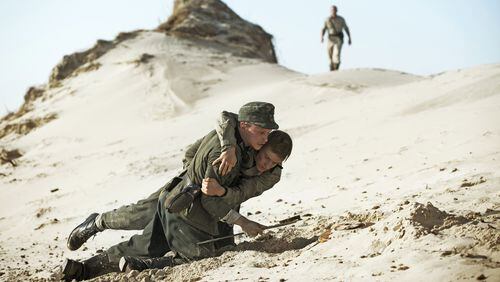“Land of Mine” is a fictionalized version of a neglected piece of postwar history, detailing the often-ruthless practice of using World War II German prisoners to defuse land mines.
When the war ended, the Danish coast was infested with hundreds of thousands of explosives, placed on the beaches by Germans to repel what Hitler believed would be a massive Allied invasion.
It never came, and in defeat, German prisoners were assigned the deadly job of finding and defusing the bombs.
The victors thought this right and proper at the time, and even today you’d probably find widespread agreement with the idea that those who planted the mines should bear the risk of defusing them.
As we see in the Danish-made “Land of Mine,” the man assigned the job of supervising these German prisoners, Sgt. Rasmussen (Roland Moller), certainly holds this view. In an early scene, he stops a POW who’s carrying a purloined flag, a souvenir of the war, and beats the man to a bloody pulp.
Later Rasmussen is assigned to supervise a squad of poorly trained prisoners on a remote Danish beach. War has hardened him, and he is initially and authentically uninterested in the appalling mortality rate suffered by the men.
Despite efforts to keep the prisoners at arms’ length, he begins to befriend a few. The Germans are glaringly young, just teens, dragged into the war in its desperate final months, and the older Rasmussen gradually succumbs to an obligation to be a father to them.
It’s a lonely outpost, just the sergeant and the prisoners and miles of empty beach – a spare and desolate place (beautifully photographed), an isolation that leaves Rasmussen with the latitude to create his own moral order. They are starving, he brings them food. They are exhausted, he gives them a day off. He allows them to devise safer methods of finding ordnance. This causes friction with other allied officers, many of whom are still fighting the war, still eyeing the prisoners as combatants.
Here the movie takes the idea of defusing dangerous explosives and makes it symbolic. The United States and its allies eventually saw the wisdom of rebuilding defeated nations to avoid a repeat of post-World War I dynamics.
Rasmussen becomes a one-man Marshall Plan, sensing that the inhumane treatment of the prisoners risks repeating a cycle of violent humiliation.
That made him atypical. Of the 2,000 Germans assigned to defuse bombs on Danish beaches, 1,000 were killed.
MOVIE REVIEW
“Land of Mine”
Grade: B
Starring Mikkel Boe Følsgaard, Laura Bro and Roland Møller. Directed by Martin P. Zandvliet.
Rated R for violence, some grisly images, and language. Check listings for theaters. 1 hours, 40 minutes.
Bottom line: A post-war history that takes the idea of defusing explosives and makes it symbolic






